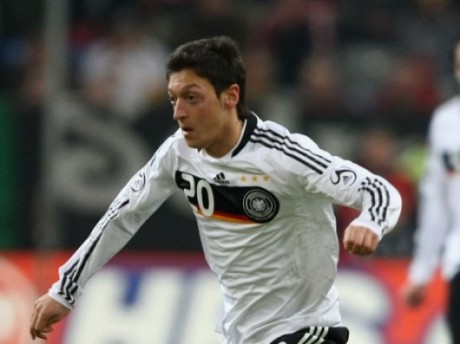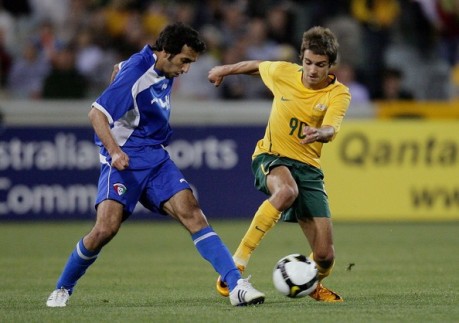Ghana 1 Australia 1
Ghana: Kingson; Paintsil, Mensah, Addy, Sarpei; Annan, KP Boateng (Amoah 88); Tagoe (Owusu-Abeyie 56), Asamoah (Muntari 77), Ayew; Gyan
Australia: Schwarzer; Wilkshire (Rukavytsya 85), Neill, Moore, Carney; Culina, Valeri; Emerton, Holman (Kennedy 68), Bresciano (Chipperfield 66); Kewell
Australia impressively held out to secure a 1-1 draw against Milovan Rajevac’s Ghana in Rustenburg this afternoon despite the early sending off of Harry Kewell in an entertaining game which has left the closely-fought Group D poised for an enthralling finish next week.
Two lots of 4-2-3-1
Both sides were set up by their respective Coaches to play 4-2-3-1, matching each other across the field with the only slight differences between the systems being that Ghana’s wide midfielders were slightly more advanced and their second holding midfielder, Kevin-Prince Boateng, was given more license to get forward and create.
The main question surrounding the Australian selection was whether Pim Verbeek should have opted to play physical target-man Josh Kennedy up against the inexperienced Ghanaian centre-half pairing of Jonathan Mensah and Lee Addy, or perhaps two out-and-out strikers rather than again choosing to deploy an attacking midfielder – Harry Kewell – in the centre-forward role.
The early stages of the game played out much as expected, both teams mirroring each other in the midfield and failing to find much penetration, but the pattern of the game was altered when Richard Kingson’s error from Mark Bresciano’s free-kick allowed Brett Holman to steal in and put Australia ahead.
Ghana reacted surprisingly positively to going behind so early in the tie, instantly showing a greater intensity and willingness to get forward after a sluggish start. Kwadwo Asamoah upped his work-rate in his role as the Black Stars’ playmaker and Andre Ayew started to cut in off his wing to regularly test the Australian full-backs with his pace and skill as Rajevac’s side pushed hard to get straight back into the game.
It was as a direct result of one of Ayew’s forays into the inside right channel that Ghana were presented with the opportunity to equalise, the Marseille midfielder riding two or three Australian challenges to cut the ball back for Jonathan Mensah whose shot was prevented from crossing the line by the arm of Harry Kewell. Kewell was dismissed by referee Robert Rosetti and Asamoah Gyan converted the resulting spot-kick to restore parity.
Dismissal brings change

Australia after introduction of Kennedy
Kewell’s sending-off saw Verbeek change his team’s shape to a 4-5-0/4-4-1, Brett Holman often the furthest man forward with Bresciano and Brett Emerton making every effort to support him in attack breaking from midfield.
In adapting their system to cater for losing a player the Australians sacrificed much of possession, the West Africans looking far more dangerous for the remainder of the half and looking much more comfortable on the ball.
However, after the interval the Socceroos began to play their way back into the fixture having soaked up a great deal of Ghanaian pressure, Luke Wilkshire and David Carney pushing on from full-back to support the increasingly adventurous midfield.
The introduction of Scott Chipperfield for Bresciano gave Australia extra pace and natural width down the left side, something which troubled a slightly out-of-sorts John Paintsil, but it was Brett Holman’s replacement, Kennedy, who tipped the game back in the favour of Verbeek’s side.
The Kennedy factor
The Nagoya Grampus forward was used as the focal point of the Australian attack after coming on with 20 minutes to go, keeping Addy and Mensah occupied, exposing their flaws and forcing the Ghanaian system to become far narrower in the face of a 4-4-1 with the wide midfielders tucked in behind a target man.

Such was Kennedy’s impact that it seemed strange that Verbeek had not selected him from the outset, the striker’s presence forcing the Black Stars to change their defensive approach to such an extent that they appeared to lose their passing rhythm, giving the ball away in midfield with more regularity after Emerton and Chipperfield had come infield and crowded the area where Ghana had dominated all afternoon.
Indeed, it was Australia that enjoyed the best of the late chances, Wilkshire denied by a superb Richard Kingson save as the Antipodeans played with more freedom towards the end of the game. In fact the final minutes of the game were some of the most entertaining as Ghana finally pushed hard to exploit their one-man advantage, Paintsil and Hans Sarpei bombing forward from full-back to get in behind the Australian defence at serious risk of being caught out on the counter-attack.
Rajevac attempted to freshen up his attacking options in the dying minutes, but Sulley Muntari and Matthew Amoah failed to make an impact having been brought on to overrun the Socceroos’ midfield and support Gyan in testing the back line, Verbeek ensuring his team saw out a period of late pressure to come away with a point they will be more than happy with considering the circumstances.
Group D in the balance
Ghana will be hugely disappointed that they didn’t capitalise on their opponents’ shortage of personnel despite having much of the play, but this was an admirable performance with10 men from an Australia side that deserves an awful lot of credit for their resolute display and willingness to get forward even when handicapped by the Kewell sending-off.
The Black Stars now need a point against Germany in their final game of the group on Wednesday to guarantee progression to the last 16, with the Australians having to beat a strong Serbia side and rely on the other result going their way for them to have a chance of qualifying. Group D, seen as the toughest in the competition by many, could hardly be more finely-balanced going into the deciding round of fixtures.








